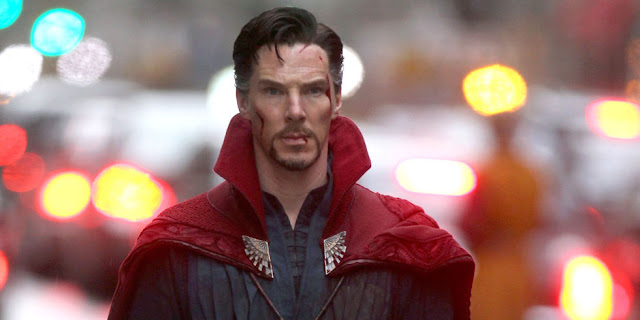"Success is determined not by whether or not you face obstacles,
but by our reaction to them. And if you look at these obstacles as a
containing fence, they become your excuse for failure. If you look at
them as a hurdle, each one strengthens you for the next." Dr. Ben
Carson, Gifted Hands: The Ben Carson Story
If you thought Tony Stark was the most arrogant and pompous egomaniac to ever become a superhero, Dr. Stephen Strange may present some competition for that title. Strange is a self-made man whose gifted hands have made him a savior to many hopeless medical cases. His precise skills as a surgeon have brought him wealth, fame, and a proud sense of entitlement to all the worship that his successes have ushered in. Strange has little concern for anyone outside of their ability to further inflate his ego; he is a god in his own eyes.
In the blink of an eye, the hands that were once so skilled, steady, and precise, are replaced with shaking and palsied hands that can barely clutch a pen in their curled fingers. Broken, devastated, yet unhumbled and unable to accept the failed outcomes of one medical lead after another, Stephen's narcissistic determination drives him to the far eastern lands of Nepal to seek a more unconventional healing for his physical obstacles. But of course, as this is Marvel, he will most certainly find more than he was looking for.

Benedict Cumberbatch seems to shine most when portraying egotistical social deviants, and
Doctor Strange is no exception. Whether it's the knowledge that for better or worse, this is your protagonist, or the inexplicable draw that current audiences have towards less than upright heroes, you can't help but hope for the best for Strange, despite his persistently mortifying self-importance. He is genuinely pitiful as he unsteadily walks the line between pretentious denial and looming despair. But then again, it's a bit of a pleasure to watch him fumble and trip his way through learning the crafts of the Ancient One. The sharpness of his wit never dulls, but eventually his self-absorption transforms into something more noble, and he even learns to care. More importantly, he learns to regret.
Dr. Strange stands out as one of the most original and engaging origin stories we've seen from MCU in a while. Every origin story has something unique to it, but
Dr. Strange rises above the standard in almost every way. Visually,
Dr. Strange is colorful and mesmerizingly psychedelic, but stylishly avoids the empty grandeur and self-conscious pomp of
Thor, for example. Instead, the kaleidoscopic visuals bend and fracture hypnotically to serve the story and illustrate the limitless expanse beyond our dimension.
Furthermore,
Dr. Strange does not weigh itself down in obligatory exposition, but concerns itself only with the here, now, and onwards. Did Stephen Strange hail from a privileged family, or did his own determination lift himself out of the ghettos? Refreshingly, we don't know because we don't have to. We know that Stephen had a rather ill-fated romance with fellow doctor Christine Palmer (played with grounded maturity by Rachel McAdams) at some point in the off-screen past, but it takes little imagination to surmise why it ended. Flashbacks would have been too confusing in this mind-bending world of mirroring dimensions, so the chronological story helps to keep things grounded enough to avoid feeling hallucinatory.
Dr. Strange is full of lively characters and snappy dialogue amidst its celebrated CGI features. Even the characters that initially seem archetypal break the mold. The Ancient One, for example, is a far cry from the sagely Obi-Wan Kenobi, hardened leader R'as Al Ghul, or even the worldly-wise Professor X; the Ancient One is equal parts eccentric mentor and comic relief, while being a fluidly moving warrior herself. Dr. Christine Palmer is no damsel in distress, nor is she the lovesick lady who vows to always love her man. Christine is a strong and independent woman who is kind to Stephen, but perfectly capable of walking away when his behavior becomes inexcusable. Baron Mordo at first seems to fulfill the role of the mentor's butler, or maybe a future sidekick, but if you wait for the famous post-credits scenes that MCU loves to tease with, you'll know that there's more to him yet to be revealed. Really, the villain is the only one who doesn't surprise much. That's not to say that Mads Mikkelson plays his part poorly-- quite the contrary, he fulfills his role excellently-- but that his role is just straightforward.
A few months ago, I believed that MCU and DC movies were on the decline as the trend of superhero infatuation seemed to be dwindling fast. With most of the major superheroes already covered in at least two movies each if not more, things were starting to feel stale and unoriginal.
Dr. Strange delivers a new, fresh, vibrant installment to the MCU, carrying with it a unique superhero and an excellent actor. Whatever future installments may bring,
Dr. Strange easily ranks among the best of the MCU, proving that there are a few more tricks yet to be seen from comic book movies.


